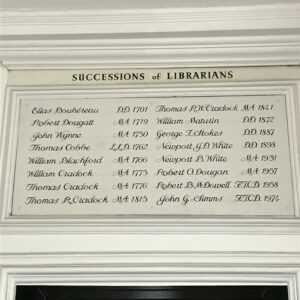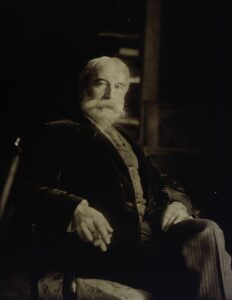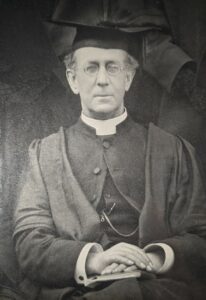
‘With Apologies for Troubling You’ : Marsh’s 19th- and 20th-century Librarians
Dr Michelle Johansen, Associate Fellow at London’s Institute of Historical Research, reports on her recent Maddock Fellowship at Marsh’s Library.

The list of Librarians (to 1979), above the entrance into the first gallery of Marsh’s. The list continues on the east wall.
My research is concerned with the workplace experiences of over 200 public librarians. Most of my subjects were autodidacts from relatively humble backgrounds who held senior posts in British municipal libraries from the 1870s to the 1920s.
I’ve also looked at librarians who enjoyed elite experiences behind the library desk, such as Sir John Young Walker MacAlister (1856–1925). MacAlister was the Librarian of the Royal Medical and Chirurgical Society in London. He helped found the Royal Society of Medicine and played a part in shaping an emergent library profession from the late nineteenth century.
Being awarded a Maddock Research Fellowship meant I was able to travel from London to Dublin to explore staffing practices at Marsh’s Library. As with the case of MacAlister, I wanted to see how far practices at Marsh’s reflected the experiences of ‘my’ librarians – and the ways in which they differed.

Portrait of Sir John MacAlister (1856 – 1925) from the Wellcome Trust collection.
There were some points of comparison. Municipal librarians displayed a preoccupation with domestic concerns, and the records at Marsh’s Library show that their Librarian (or Keeper) also dealt with humdrum housekeeping matters: attending to leaky bathroom pipes; buying soft furnishing for the reading room; arranging roof repairs after a heavy fall of snow; and so on. But overall the Keeper of Marsh’s Library enjoyed a more leisurely experience than the average public librarian. The Annual Reports and the Visitor Books indicated that approximately 140 unique researchers made around 400 visits to the Library per year c. 1900. The chief librarian at a large London municipal library dealt with 500 users daily at this time, rising to upwards of one thousand visitors on a busy Saturday!
During my Fellowship, I was directed towards a folder of staff correspondence that included two letters written by the under keeper William Edmund Armstrong Moore (1882-1923). With the approval of the Library trustees Moore was trying to secure an increase in his salary – a salary described as ‘wholly inadequate’ in the Visitation Report for 1919. Moore was an educated gentleman from an elite background whose unsatisfactory income (which fell short of the amount received by a junior assistant in a typical municipal library) caused much concern. Apologising for troubling them, he was forced to take the humiliating step of writing to two key figures to seek help. One of these figures was the president of the professional body responsible for libraries and librarianship, Sir John Young Walker MacAlister.

Portrait of Newport J.D. White, Keeper of Marsh’s Library, 1898-1931.
I’d expected to make some useful discoveries during my Maddock Research Fellowship, but I hadn’t thought I would locate items that so richly complicated my understanding of what it meant to work in an ‘elite’ library. And I certainly hadn’t imagined that I would find correspondence exchanged with one of my existing librarian subjects.
Thank you to the team at Marsh’s Library for directing me towards this exciting discovery in the archives. The experience of William Moore will now feature alongside that of MacAlister in a passage describing alternative forms of librarianship in my biographical study of public libraries in the long nineteenth century.
Dr Michelle Johansen




